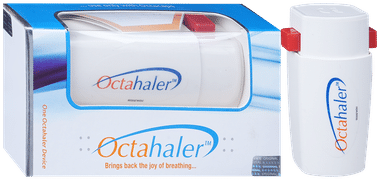R-Cin Suspension
Product introduction
R-Cin Suspension is an antibiotic, used in the treatment of all forms of tuberculosis, an infectious disease that mainly affects the lungs and in some cases other parts of the body. It may be used alone or in combination with other medicines to fight serious infections.
R-Cin Suspension may also be given to people who are carriers (people who are infected, yet do not show any signs and symptoms of infection). It should be taken on an empty stomach, at least 30 minutes before a meal or 2 hours after a meal. It should be taken in the dose and duration as advised by the doctor. It is better to take it at the same time each day to get the most benefit and you should keep on taking this medicine for as long as you are prescribed. Stopping it early may make the infection to come back and harder to treat.
Some people may develop side effects like low blood platelets, headache, dizziness, vomiting, nausea, and fever. These side effects are usually temporary and go away during treatment as your body adjusts to the medicine. Consult your doctor if these side effects bother you or will not go away.
Before starting treatment with this medicine, you should tell your doctor if you are pregnant, breastfeeding or suffering from any liver, kidney or heart problems or if you are allergic to any medicine. You may be regularly monitored with blood tests for liver function tests while using this medicine.
R-Cin Suspension may also be given to people who are carriers (people who are infected, yet do not show any signs and symptoms of infection). It should be taken on an empty stomach, at least 30 minutes before a meal or 2 hours after a meal. It should be taken in the dose and duration as advised by the doctor. It is better to take it at the same time each day to get the most benefit and you should keep on taking this medicine for as long as you are prescribed. Stopping it early may make the infection to come back and harder to treat.
Some people may develop side effects like low blood platelets, headache, dizziness, vomiting, nausea, and fever. These side effects are usually temporary and go away during treatment as your body adjusts to the medicine. Consult your doctor if these side effects bother you or will not go away.
Before starting treatment with this medicine, you should tell your doctor if you are pregnant, breastfeeding or suffering from any liver, kidney or heart problems or if you are allergic to any medicine. You may be regularly monitored with blood tests for liver function tests while using this medicine.
Uses of R-Cin Oral Suspension
Benefits of R-Cin Oral Suspension
In Tuberculosis (TB)
R-Cin Suspension is used to treat tuberculosis, an infectious disease that mainly affects the lungs but can affect other parts of the body as well. It kills as well as stops the growth of infection causing bacteria and helps in treating the infection. Take it in the dose and duration advised by the doctor. Your symptoms may improve before the infection is completely cured. Do not stop taking it without consulting your doctor as doing so may cause the infection to return or worsen. Follow your doctor’s instructions carefully to get maximum benefit.
Side effects of R-Cin Oral Suspension
Most side effects do not require any medical attention and disappear as your body adjusts to the medicine. Consult your doctor if they persist or if you’re worried about them
Common side effects of R-Cin
- Low blood platelets
- Dizziness
- Vomiting
- Nausea
- Fever
- Abdominal pain
- Skin rash
- Hepatitis (viral infection of liver)
- Headache
- Chills
- Paradoxical reactions
- Increased aspartate aminotransferase
- Increased alanine aminotransferase
- Increased bilirubin in the blood
How to use R-Cin Oral Suspension
Take this medicine in the dose and duration as advised by your doctor. Check the label for directions before use. Measure it with a measuring cup and take it by mouth. Shake well before use. R-Cin Suspension is to be taken empty stomach.
How R-Cin Oral Suspension works
R-Cin Suspension is an antibiotic. It works by inactivating a bacterial enzyme (RNA-polymerase) which is required by bacteria to make essential proteins and to reproduce.
Safety advice
Alcohol
UNSAFE
It is unsafe to consume alcohol with R-Cin Suspension.
Pregnancy
CONSULT YOUR DOCTOR
R-Cin Suspension may be unsafe to use during pregnancy. Although there are limited studies in humans, animal studies have shown harmful effects on the developing baby. Your doctor will weigh the benefits and any potential risks before prescribing it to you. Please consult your doctor.
Breast feeding
SAFE IF PRESCRIBED
R-Cin Suspension is safe to use during breastfeeding. Human studies suggest that the drug does not pass into the breastmilk in a significant amount and is not harmful to the baby.
Driving
UNSAFE
R-Cin Suspension may cause side effects which could affect your ability to drive.
You may feel dizzy or faint, have problems with vision or have other side effects that could affect your ability to drive.
You may feel dizzy or faint, have problems with vision or have other side effects that could affect your ability to drive.
Kidney
CAUTION
R-Cin Suspension should be used with caution in patients with kidney disease. Dose adjustment of R-Cin Suspension may be needed. Please consult your doctor.
Liver
CONSULT YOUR DOCTOR
There is limited information available on the use of R-Cin Suspension in patients with liver disease. Please consult your doctor.
What if you forget to take R-Cin Oral Suspension?
If you miss a dose of R-Cin Suspension, take it as soon as possible. However, if it is almost time for your next dose, skip the missed dose and go back to your regular schedule. Do not double the dose.
All substitutes
For informational purposes only. Consult a doctor before taking any medicines.
No substitutes found for this medicine
Quick tips
- Your doctor has prescribed R-Cin Suspension to cure your infection and improve symptoms.
- It is best taken on an empty stomach. If you get an upset stomach, try taking it with small portions of food.
- Your urine, tears and other secretions may become orange-red in colour. Avoid using contact lenses since they may become discolored.
- Tell your doctor about all other medicines you are taking as R-Cin Suspension can interact with many medicines.
- Avoid taking hormone-based birth control methods as R-Cin Suspension may decrease their effectiveness.
- Tell your doctor immediately if you experience unusual tiredness or loss of appetite, fever or chills.
Fact Box
Chemical Class
Macrolactams
Habit Forming
No
Therapeutic Class
ANTI INFECTIVES
Action Class
RNA polymerase inhibitors- Rifamycins
Interaction with drugs
Taking R-Cin with any of the following medicines can modify the effect of either of them and cause some undesirable side effects
Do not consume Nevirapine with Rifampicin. Rifampicin may reduce blood levels and efficacy of Nevirapine.
Do not consume Voriconazole with Rifampicin. Rifampicin may reduce blood levels of Voriconazole.
Do not consume Ticagrelor with Rifampicin. Rifampicin may reduce blood levels of Ticagrelor.
Do not consume Ranolazine with Rifampicin. Rifampicin may reduce blood levels and efficacy of Ranolazine.
Avoid concurrent use. Please consult with your doctor. Rifampicin may reduce the efficacy of Bortezomib.
Patient concerns
User feedback
Patients taking R-Cin Suspension
Once A Day
98%
Twice A Day
2%
What are you using R-Cin Oral Suspension for?
Tuberculosis *
80%
Leprosy
13%
Others
7%
*Tuberculosis (TB)
How much was the improvement?
Average
57%
Excellent
29%
Poor
14%
What were the side-effects while using R-Cin Suspension?
No Side Effec*
83%
Headache
17%
*No Side Effect
How do you take R-Cin Oral Suspension?
With food
75%
Empty stomach
25%
Please rate R-Cin Suspension on price
Expensive
75%
Not Expensive
25%
FAQs
Is rifampin a penicillin/amoxicillin/sulfa drug?
No. Rifampin is an antibiotic commonly used in the treatment of tuberculosis and leprosy. It has a structure and mechanism of action different from penicillin or amoxicillin (amoxicillin belongs to the class of penicillin antibiotics). The chemical structure and mechanism of action of rifampin is different from sulfa drugs
Is rifampin bacteriostatic or bactericidal?
Rifampin is a bactericidal drug. It acts by blocking the activity of a bacterial enzyme called DNA-dependent RNA polymerase which essential for important life processes in the bacteria, thereby killing the bacteria
Is rifampin an inducer or inhibitor?
Rifampin is an inducer (increases activity) of an important liver enzyme system that is responsible for the final processing and elimination of several drugs from the body
What is R-cin 600 used for?
R-cin 600 is a trade name for active drug rifampin 600 mg. Rifampin is an antibiotic commonly used in the treatment of tuberculosis and leprosy. It is also used in the prevention of meningococcal meningitis and Haemophilus influenza infections. It may also be used in combination with other drugs to treat infections-Brucellosis, Legionnaires disease or serious staphylococcal infections
What is R-cinex/Macox plus/R-cinex 600?
R-cinex and Macox plus are trade names for a combination of active drugs rifampin and isoniazid. It is used in the treatment of tuberculosis. R-cinex 600 and Macox plus contains 600 mg of active drug rifampin and 300 mg of active drug isoniazid
Can I take rifampin with ibuprofen/acetaminophen (Tylenol)?
Rifampin has no known serious drug interaction with ibuprofen or acetaminophen (trade name: Tylenol). Inform your doctor about all the medication you are currently taking to avoid interactions that may reduce effectiveness of any treatment or aggravate side effects
Does rifampin cause weight gain/weight loss/ hair loss/ constipation/ yeast infection?
No. Changes in body weight, hair loss or triggering constipation are not among the known side effects of rifampin. Rifampin is an antibiotic commonly used in the treatment of tuberculosis and leprosy. It has no known effect on causing yeast infections
Does rifampin cause headaches?
Yes. Headache is a possible side effect of rifampin
Does rifampin change urine color/turn urine orange?
Yes. Taking rifampin may change the color of your urine (skin, sweat, saliva, tears and feces) to brownish-red or orange. This effect is not harmful
Does rifampin cause liver damage?
Rifampin is safe when used at prescribed doses for the prescribed duration. Constant monitoring of liver function is important while on treatment with rifampin. Taking drugs like saquinavir, ritonavir with rifampin can cause severe liver damage. Do consult your doctor if you have any liver problem before taking rifampin.
Disclaimer:
Tata 1mg's sole intention is to ensure that its consumers get information that is expert-reviewed, accurate and trustworthy. However, the information contained herein should NOT be used as a substitute for the advice of a qualified physician. The information provided here is for informational purposes only. This may not cover everything about particular health conditions, lab tests, medicines, all possible side effects, drug interactions, warnings, alerts, etc. Please consult your doctor and discuss all your queries related to any disease or medicine. We intend to support, not replace, the doctor-patient relationship.References
- Gumbo T. Chemotherapy of Tuberculosis, Mycobacterium Avium Complex Disease, and Leprosy. In: Brunton LL, Chabner BA, Knollmann BC, editors. Goodman & Gilman’s: The Pharmacological Basis of Therapeutics. 12th ed. New York, New York: McGraw-Hill Medical; 2011. pp. 1550-554.
- Briggs GG, Freeman RK, editors. A Reference Guide to Fetal and Neonatal Risk: Drugs in Pregnancy and Lactation. 10th ed. Philadelphia, PA: Wolters Kluwer Health; 2015. pp. 1213-14.
Marketer details
Name: Lupin Ltd
Address: 3rd floor Kalpataru Inspire, Off. W E Highway, Santacruz (East), Mumbai 400 055. India
Country of origin: India
Lab tests offered by us

Related/Popular tests
NOT FOR SALE
We do not facilitate sale of this product at present











